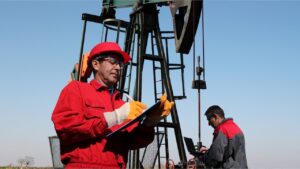
Petroleum geology is a fascinating field that plays a crucial role in the exploration and extraction of oil and gas resources. In this blog post, we will delve into the responsibilities of a petroleum geologist, the educational path to becoming one, and the key companies in the industry. Let’s explore the exciting world of petroleum geology together.
Petroleum geologists are professionals who specialize in studying the Earth’s crust to identify and assess potential oil and gas reserves. They play a crucial role in the energy industry by providing valuable insights into the location and viability of hydrocarbon resources.

To embark on a career as a petroleum geologist, individuals typically pursue a Bachelor’s degree in Geology, Geoscience, or a related field. Advanced degrees such as Master’s or Ph.D. are often preferred for more specialized roles and research positions
Petroleum geologists engage in a variety of tasks to locate and evaluate oil and gas reserves. Some key responsibilities include:
Conducting Geological Surveys: Examining surface and subsurface features to identify potential reservoirs.
Well Site Evaluation: Analyzing data from drilling sites to assess the viability of extraction.
Risk Assessment: Evaluating the financial and environmental risks associated with drilling projects.
Collaborating with Engineers: Working closely with drilling and reservoir engineers to optimize extraction methods.

Successful petroleum geologists possess a combination of technical and interpersonal skills, including:
Geological Modeling: Using specialized software to create accurate models of subsurface structures.
Analytical Thinking: Interpreting complex data and making informed decisions.
Communication Skills: Effectively conveying findings and recommendations to diverse stakeholders.

The exploration phase involves various techniques, such as seismic surveys, well logging, and geochemical analysis, to determine the presence and characteristics of oil and gas reservoirs.
Petroleum geologists can explore diverse career paths, including roles in oil companies, consulting firms, and research institutions. Additionally, they may specialize in areas like reservoir characterization, basin analysis, or environmental geology.
| University Name | Location |
|---|---|
| Stanford University | Stanford, CA |
| Texas A&M University | College Station, TX |
| University of Texas at Austin | Austin, TX |
| Colorado School of Mines | Golden, CO |
For those aspiring to work in the industry, here is a list of top companies known for hiring petroleum geologists:
| Company Name | |
|---|---|
| ExxonMobil | |
| Chevron Corporation | |
| Shell | |
| ConocoPhillips | |
| BP (British Petroleum) |
In conclusion, a career as a petroleum geologist is both challenging and rewarding. From educational pursuits to on-the-job responsibilities, individuals in this field contribute significantly to the world’s energy resources. Whether you are considering entering the field or seeking to hire a petroleum geologist, this guide provides valuable insights into the profession.
| Cookie | Duration | Description |
|---|---|---|
| cookielawinfo-checkbox-analytics | 11 months | This cookie is set by GDPR Cookie Consent plugin. The cookie is used to store the user consent for the cookies in the category "Analytics". |
| cookielawinfo-checkbox-functional | 11 months | The cookie is set by GDPR cookie consent to record the user consent for the cookies in the category "Functional". |
| cookielawinfo-checkbox-necessary | 11 months | This cookie is set by GDPR Cookie Consent plugin. The cookies is used to store the user consent for the cookies in the category "Necessary". |
| cookielawinfo-checkbox-others | 11 months | This cookie is set by GDPR Cookie Consent plugin. The cookie is used to store the user consent for the cookies in the category "Other. |
| cookielawinfo-checkbox-performance | 11 months | This cookie is set by GDPR Cookie Consent plugin. The cookie is used to store the user consent for the cookies in the category "Performance". |
| viewed_cookie_policy | 11 months | The cookie is set by the GDPR Cookie Consent plugin and is used to store whether or not user has consented to the use of cookies. It does not store any personal data. |